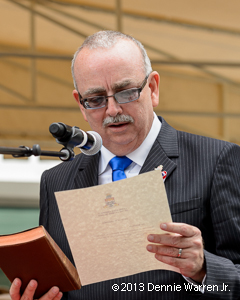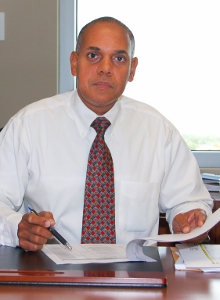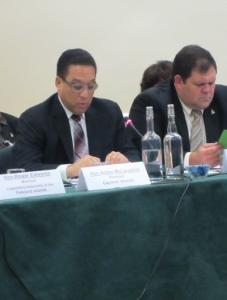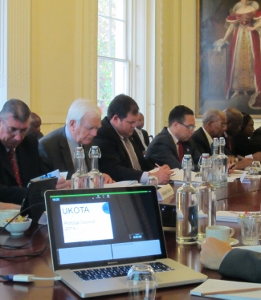 Politics
Politics

NCL to be in force January
 (CNS): The environment minister has said that the National Conservation Law passed in the Legislative Assembly on Friday with the unanimous support of the parliament should be implemented in January. Wayne Panton said that because the new legislation repeals the old Marine Conservation Law, regulations will have to be drafted to ensure that all of the species that were protected under that slide over to be protected under the new legislation. He said that officials should be able to complete that work and the amendments to the draft legislation in the New Year and pass the final law to Cabinet to approve the start day before the end of January.
(CNS): The environment minister has said that the National Conservation Law passed in the Legislative Assembly on Friday with the unanimous support of the parliament should be implemented in January. Wayne Panton said that because the new legislation repeals the old Marine Conservation Law, regulations will have to be drafted to ensure that all of the species that were protected under that slide over to be protected under the new legislation. He said that officials should be able to complete that work and the amendments to the draft legislation in the New Year and pass the final law to Cabinet to approve the start day before the end of January.
The changes made to the bill by the minister as well as those proposed and accepted by the independent members have also been released (see below) so the public can see where the draft, which was published prior to the debate, has been changed as a result of input from the public and from MLAs.
From the introduction of mandated open meetings, which was proposed by Panton, to the requirement for the Conservation Council to consult with the adjoining landowners wherever it designates conservation areas, which was put forward by the North Side MLA Ezzard Miller, there were more than 30 amendments put forward during the committee stage on Friday, which led to the minister achieving the full backing of the Legislative Assembly for the long awaited bill.
Some of the amendments were administrative, others more significant and some were made to give comfort to members and reassure them that the bill was not a 'land grab', as had been suggested during the debate.
The word "acquired" was change to "purchase" in relation to government buying land to set aside as a conservation area, which was of particular concern to Miller, who had challenged the minister to back his position that government would not use the acquisitions law to force land sales by changing the word — a challenge which Panton met.
Controversy has arisen, however, over two changes to the law. Efforts by the minister to reduce the use of spear guns were thwarted by a back-bench rebellion on the importation of parts for existing spear gun licence holders. This, however, will not only delay the eventual ban on spear guns in local waters, it will also clash with the customs law, which prevents the importation of spear gun parts, even by Caymanian license holders.
The removal of the clause that required someone caught in a marine park with conch and lobster to explain where they got them will continue to tie the hands of enforcement officers as they will still not be able to arrest people unless they catch them in the water with the catch in their hands. This is now at odds with a major concern raised by the public, not just during the recent round of public meetings but for years, that enforcement officers need to catch poachers.
However, regardless of the two issues which may cause problems down the line, Department of Environment Director Gina Ebanks-Petrie, who has been pressing for the law almost as long as she has been working for the department, was pleased that the legislation was now passed. The minister too expressed his delight at the support he was able to gain from the House.
See all of the amendments below, along with the draft legislation for ease of reference.

Ironwood log tabled in LA
 (CNS): Over the years thousands of documents have been tabled in the Legislative Assembly for public access but for the first time in history last week an Ironwood log was laid on the parliament’s table by the member for East End. Responding to the criticism about objectors to the National Conservation Law by Environment Minister Wayne Panton, Arden McLean brought the piece of local tree into the House to make a point about conservation in the eastern districts without the need for legislation. The independent members have largely rural constituencies with small populations and have raised concerns that their districts will be targeted for land grabs by government.
(CNS): Over the years thousands of documents have been tabled in the Legislative Assembly for public access but for the first time in history last week an Ironwood log was laid on the parliament’s table by the member for East End. Responding to the criticism about objectors to the National Conservation Law by Environment Minister Wayne Panton, Arden McLean brought the piece of local tree into the House to make a point about conservation in the eastern districts without the need for legislation. The independent members have largely rural constituencies with small populations and have raised concerns that their districts will be targeted for land grabs by government.
Both McLean and North Side MAL Ezzard Miller suggested during the debate that the government would be seeking to forcibly acquire or intimidate their constituents into giving up their land in North Side and East End, where most of Cayman’s remaining natural resources now lie, as a result of the destruction of George Town and West Bay because of development.
During last week’s LA debate on the conservation law the log became symbolic for the debate and in particular for the eastern district members, as McLean said that the people of East End would see the National Conservation Law as an encroachment on their past guardianship of the eastern side of the island by those in the western side who have “cut down all their trees and now they want to come and save East End”.
During his presentation of the bill Panton suggested that people talked a lot and claimed to support conservation while deriding the law, and he accused them of being prepared to cut down an endangered Ironwood tree so they could sit on the stump and talk about conservation.
McLean said he found it offensive and had brought the log to show to Panton and the other members as he suspected that some of them may not recognize what Ironwood looks like.
It was Ironwood that had played a part in putting an end to plans for a new road in George Town when McLean was responsible for roads when he served in the 2005-2009 PPM cabinet. Found nowhere else in the world, the local species of Cayman Ironwood is extremely hard dense wood and was in demand for building purposes throughout the islands' history. Many were cut down as a result and the tree is now endangered .
McLean said that when he was in office conservation had stifled government projects as he accused civil servants of being “tree huggers” when they should have been carrying out government policy. He spoke specifically about the George Town Ironwood forest, which became the centre of the protest against an extension of the east-west arterial road through an area that is home to several of critically endangered species. He said the pressure from the public has resulted in the road extensions being stopped
Although McLean was to eventually support the law following a number of changes, such as the retention of spear fishing for locals already in possession of spearguns, during the debate he suggested the law would stifle the country.
Local passports in jeopardy
(CNS): The Cayman Islands Government is beginning a fight with the UK over the future of Cayman-specific British Passports and the ability of the local passport office to issue emergency passports, especially to those who are in need of overseas medical attention. Premier Alden McLaughlin said Friday that he has “some grave concerns” about the UK government’s plans to replace local, non-biometric variant passports in its territories with British biometric ones and the need for the implementation of a new and costly regime. During the recent trip to the UK for the Joint Ministerial Council (JMC) meeting with the Foreign Office, Cayman delegates also met with the Home Office over the proposed long term plan to repatriate passport printing.
Speaking in the Legislative Assembly on Friday, McLaughlin said the UK had issued a December 2014 deadline for the implementation of the new system, putting an end to the Cayman passport office’s ability to issue its own passports, as has been common for many years.
The premier said the UK had presented the overseas territories with various options but they all present some issues for the future of Cayman-specific passports, not least what McLaughlin said was the prohibitively high costs of implementing the respective systems.
The UK has said the local government can phase in a biometric fully automated specific system but this could cost millions of dollars to maintain and the passports, which will no longer be Cayman specific, will be printed and issued in the UK and sent back here. Although government will still be able to issue emergency passports from its existing non-biometric stock, once the stocks run out there will be no more.
“All of the options presented by the UK also include a scenario that would replace the Cayman Islands specific 'Variant' of the British Passport with the standard issue British Passport without any reference to the Cayman Islands. We have requested that the UK printed bio-metric passports be Cayman Islands specific variants,” he said
Aside from cost and the loss of Cayman’s own passport, the need to issue local emergency passports is essential for Cayman and often mean the difference between life and death in medical emergencies, the premier said.
“Many in this House know ofa recent incident in which a veteran seaman who hasn’t travelled since he gave up his life at sea had a heart attack and had to be airlifted to Miami,” he said. “He did not have a current passport as he did not see the need for one. If we had not had the ability to produce an emergency passport for him, his family would be in mourning over his death at this time of Christmas. Instead, I am happy to report that we were able to provide the emergency passport and he is back home, as of this week, to celebrate this joyful time of year with his loved ones. We have asked that the Cayman Islands retain the ability to issue emergency passports here on home soil.”
While local stock levels for non-biometric passports will last until December 2014, McLaughlin said Cayman would need additional non-biometric passport stock for these emergency passports in the future, and while the government plans to purchase a large batch of non-biometric passport stock while they are still available, it is unknown when the United States will stop accepting non-biometric passports.
“Long-term provisions for locally printed emergency passports remain a concern as the providers of the laminate for the non-biometric stock of passports will no longer produce the laminate after this last batch. Therefore, once the stock is depleted, options for emergency passports are a critical unknown risk,” he warned.
“I have written a letter to FCO Minister Mark Simmonds outlining my concerns about the passports issues and have made some suggestions for a way forward for the Cayman Islands,” he said. “The Cayman Islands would like to participate in the passport printing repatriation project now being undertaken for Gibraltar and the Crown Dependencies. We see the work with Gibraltar as the most progressive option, reducing the costs to the Cayman Islands while allowing the Cayman Islands to rapidly advance the repatriation variant passport printing,” he added.
“The ultimate desire of the Cayman Islands is to have a secure passport issuance regime that meets the needs of the Cayman Islands which includes having Cayman Islands specific biometric passports that are internationally accepted and 'approved for issue' by the Cayman Islands,” he said, adding that Cayman would also need to be able to issue modern bio-metric emergency passports here in future.

C4C members will support conservation law
 (CNS): Despite the position taken by the advocacy group which endorsed them, all three of the Coalition for Cayman members have confirmed their backing for the National Conservation Law, which will be debated in the Legislative Assembly today, Wednesday 11 December. While Tara Rivers, the education and employment minister, was always bound by the collective responsibility and obligated to support the law once Cabinet gave it the nod, the two back-bench members, Roy McTaggart and Winston Connolly, are free to vote however they chose, but both men have said they will be voting 'yes'.
(CNS): Despite the position taken by the advocacy group which endorsed them, all three of the Coalition for Cayman members have confirmed their backing for the National Conservation Law, which will be debated in the Legislative Assembly today, Wednesday 11 December. While Tara Rivers, the education and employment minister, was always bound by the collective responsibility and obligated to support the law once Cabinet gave it the nod, the two back-bench members, Roy McTaggart and Winston Connolly, are free to vote however they chose, but both men have said they will be voting 'yes'.
The group that endorsed these candidates on the campaign trail in pursuit of a government of non-party aligned members released a damning attack on the law this week, stating that it would limit development instead of facilitating it and asking for yet another year of consultation.
Following the advocacy group’s public opposition to the law that they are all supporting, CNS asked the C4C-backed MLAs how they felt about the position taken by the group.
Rivers said that as a firm believer in democracy she respected C4C’s democratic right to express their position on this or any other matter it deemed important. “Likewise, I’m confident that C4C will continue to respect my position as an independently elected representative and member of Cabinet,” she added ahead of the debate.
Roy McTaggart, who is not forced to support the law, also confirmed his backing and indicated that the advocacy group’s position would not influence him. Often seen as the political leader of the group, the chair of the Public Accounts Committee said he had no concerns about the position that C4C had taken.
“As an independent candidate, I campaigned in support of the Conservation Law and will be voting in favour of it when it is put to a vote in the LA,” he stated.
Meanwhile, Winston Connolly went further and distanced himself from the advocacy group, stating that he was not a member of it.
“For the record, I have never been a C4C member, nor have I sat on their executive or had anything to do with their decision making,” he said. “They have not had any bearing on my decision making at any time, nor have I had any say in what they do. I was and remain endorsed by them with no conditions other than to vote with my conscience and be honest in my deliberations and actions."
In light of the declared intention of the public advocacy group, which is to promote independent leadership – “free of political ties" – that can be trusted to always do what’s best for the people, CNS has asked the group if it intends to continue backing the three members it endorsed, given that they are at odds over this critical piece of legislation, but C4C has not yet responded to questions.

Audit reveals NBF inequality
 (CNS): An internal audit undertaken by the education ministry has confirmed some of the concerns raised by Premier Alden McLaughlin in the Legislative Assembly recently over scholarships awarded under the controversial Nation Building Fund. The audit found that several students receiving the education grants under this fund, which was created and managed by former premier McKeeva Bush's office, have in fact received significantly more cash than students on regular Education Council scholarships. McLaughlin said in a statement that this inequality would be addressed. The audit identified that during the 2012/13 academic year 116 students received some $2.25 million from the Nation Building Fund.
(CNS): An internal audit undertaken by the education ministry has confirmed some of the concerns raised by Premier Alden McLaughlin in the Legislative Assembly recently over scholarships awarded under the controversial Nation Building Fund. The audit found that several students receiving the education grants under this fund, which was created and managed by former premier McKeeva Bush's office, have in fact received significantly more cash than students on regular Education Council scholarships. McLaughlin said in a statement that this inequality would be addressed. The audit identified that during the 2012/13 academic year 116 students received some $2.25 million from the Nation Building Fund.
This covered high school scholarships to grants for post-graduate degree programmes.
In a statement released by McLaughlin's office, officials said that most of the current students were receiving CI$25,000 or less, in line with the maximum scholarship award allowed under the scholarship provisions of the Education Council. However, 17 students were receiving between CI$27,000 and CI$63,000. These included two high school scholarship recipients, whose annual scholarship grants were US$69,590 for one student and the second was for a whopping US$71,810 per year. A third student also received CI$63,000 per annum for a tertiary grant.
The audit also revealed that twenty-five students receiving cash from the NBF scholarships are receiving an Education Council scholarship as well. Nine of the fund recipients are also receiving a scholarship from the Ministry of Tourism and at least two were found to be getting cash from all three government departments.
The audit also revealed that two sports-related high school scholarships had been awarded at a cost to government of CI$306,754 per year but the sports ministry had no involvement with these awards.
"The purported primary purpose of these scholarships appeared to be to further the athletic skills of the high school students. However, the Ministry of Sports was not involved in setting any sports related standards or goals to be achieved," the premier stated in the release.
In addition, the two recipients received a commitment for a three-year period for the annual scholarship of CI$28,000 per annum from 1 April 2013 to support their track and field training, reportedly in preparation for the 2016 Olympics.
"Again, there was no involvement of the Ministry of Sports in awarding or administering this grant," McLaughlin said. Because there is no educational or scholarship component, administration of this cash has now been handed over to the Ministry of Sports.
Students receiving money from the Nation Building Scholarships Fund have been informed that their funding will be in line with Education Council Scholarship funding and the government has invited them to give their views on the changes in writing to Cabinet.
"It is government’s intention to level the playing field and establish proper and transparent criteria that will be applied to all scholarship applicants and recipients," the government said.
Speaking in the Legislative Assembly recently, McLaughlin accused Bush, now the opposition leader, of political interference regarding the fund. He had suggested that when, as premier, Bush had created the controversial fund, he had also directed who got what amounts, which in some cases meant the cash went to the family of leading UDP members.
The issue caused the former premier to hit back and deny having a political hand in the fund. He in turn accused the current premier of playing politics and not wanting to assist Caymanians.
Bush admitted that some scholarships exceeded the limits of Education Council scholarships but said that was because these were young Caymanians who had the chance to go to specialist schools or take up specialist training and these days they needed more money.
The opposition and UDP leader also berated McLaughlin for threatening to name students, and although the premier had indicated in the LA that one of the students was a child of Bush's former political assistant, he had not directly named the student or any others, despite threatening to do so.
Bush said the premier could make him look bad all he wanted but he should not take aim at the students involved.

Government silent on FCIA
 (CNS): After more than six months in office the government appears to have made no significant advance in the talks with the Dart Group on the future of the ForCayman Investment Alliance and the so-called NRA agreement signed by the UDP administration in December 2011. Although CNS has submitted a number of questions to government regarding the current situation, there has been no response to those enquiries from officials. It is understood, however, that government has made little headway on changing the details of the NRA Deal, despite the questions raised in an independent consultants' report about the value for money for the public purse. The government has objected to the proposed 50% from tax concession in the deal but has not found an agreeable replacement concession.
(CNS): After more than six months in office the government appears to have made no significant advance in the talks with the Dart Group on the future of the ForCayman Investment Alliance and the so-called NRA agreement signed by the UDP administration in December 2011. Although CNS has submitted a number of questions to government regarding the current situation, there has been no response to those enquiries from officials. It is understood, however, that government has made little headway on changing the details of the NRA Deal, despite the questions raised in an independent consultants' report about the value for money for the public purse. The government has objected to the proposed 50% from tax concession in the deal but has not found an agreeable replacement concession.
In the immediate wake of the elections, Kurt Tibbetts, the minister with responsibility for roads, had indicated that the PPM government had begun talks with the developer and that their goal was to renegotiate the deal. The focus, he said, would be on the 50% room tax reduction offered to the group on all Dart-owned tourist accommodation for a period of ten years on anything it buys or builds for the next three decades. Tibbetts described that element of the deal as “unacceptable” but sources tell CNS that the developer is reluctant to lose such a generous concession and has pressed for significant other concessions to replace it.
Despite the promises made by the PPM on the campaign trail before the May election to find some way of creating an access through route in the area of the West Bay Road, which has now been closed, the minister indicated at an early stage that the road closure was a done deal. Instead, government would focus on other parts of the agreement.
So far, the stretch of West Bay Road between Raleigh Quay and the new by-pass junction at Yacht Drive remains open to the public and has not yet been handed over to the developer as per the agreement. It is not clear if government has yet taken possession of the land in West Bay which was promised under the deal or what has happened to the cash donations from Dart, which were also included
In addition, a law suit filed in the Grand Courts earlier this year challenging the legality of the NRA deal is scheduled for trial next week.
Dart is, however, pressing ahead with the hotel development on the former site of the Court Yard Marriott. Under the current NRA agreement, which is already signed, the developer will receive the 50% concession on all parties staying in both the 10-storey hotel and the 10-storey condo tower being built alongside.

Government aims for 4% cut in spending
 (CNS): Although government is hoping that its earnings will increase during this financial year compared to last in order to meet its predicted surplus, it will also be keeping a tight rein on public expenditure in both core government and its statutory authorities and government companies (SAGCs). Finance Minister Marco Archer has said that over the current and the next financial years government proposes to cut public spending by $22.5 million, or 4%, with a subsequent cap on increases at 1%. The initial reduction in expenses over the next two years is expected to result in early savings in tandem with improved revenue collection. As core government tightens the purse strings, the minister indicated that the SAGCs must play their part in both cuts and earnings.
(CNS): Although government is hoping that its earnings will increase during this financial year compared to last in order to meet its predicted surplus, it will also be keeping a tight rein on public expenditure in both core government and its statutory authorities and government companies (SAGCs). Finance Minister Marco Archer has said that over the current and the next financial years government proposes to cut public spending by $22.5 million, or 4%, with a subsequent cap on increases at 1%. The initial reduction in expenses over the next two years is expected to result in early savings in tandem with improved revenue collection. As core government tightens the purse strings, the minister indicated that the SAGCs must play their part in both cuts and earnings.
With prudent financial management (the minister's theme for the public purse when delivering the Strategic Policy Statement earlier this month in the Legislative Assembly), Archer said the government’s “ fundamental responsibility” was to ensure that “every dollar is well-spent”, as he pointed to streamlined resources. “We are adamant that by replacing waste and abuse in government with transparency and accountability and efficiency, our country will realize great savings in the medium and long term,” the minister said.
Aside from plans to continue cutting personnel costs, Archer indicated that the PPM administration would be placing a higher degree of reliance on savings from supplies and consumables, purchase of outputs from non-government suppliers and the purchase of outputs from statutory authorities and government owned companies.
He said that government was seeking to restructure the financial affairs of SAGCs "by mandating that comprehensive reviews of their operations be undertaken with credible and sustainable changes implemented thereafter. The goal is to improve the financial performance of the SAGC’s and make them less reliant on funding and subsidies from central government.”
Archer has not yet said which authorities or companies will face the most cuts but with the Cayman Turtle Farm sucking in $10 million in government subsidy and Cayman Airways still needing around $5 million each year from the central government, those two companies are likely to provide the starting point for government pressure.
Archers also announced during the presentation in the LA that legislation to effect “greater clarity and uniformity in the governance arrangements to be exercised by government with respect to Statutory Authorities and Government Companies is being drafted.” This was expected to be brought to the LA before the fiscal year-end, he said.

Ethics bill requires board members to know their stuff
 (CNS): The long awaited Standards in Public Life bill, which is expected to be debated in the Legislative Assembly early in the new year, will not only clamp down on members of the various boards having conflicts of interest but it will require those appointed to boards to have the relevant skills relating to the authority or government company where they are to serve. The bill also legislates for political neutrality among members to prevent the past cronyism, which has caused genuine concern and led to serious abuses on some boards overseeing public entities. Once this bill becomes law, Cabinet will need toensure it treads carefully when seeking experienced people who are not conflicted and also are able and competent.
(CNS): The long awaited Standards in Public Life bill, which is expected to be debated in the Legislative Assembly early in the new year, will not only clamp down on members of the various boards having conflicts of interest but it will require those appointed to boards to have the relevant skills relating to the authority or government company where they are to serve. The bill also legislates for political neutrality among members to prevent the past cronyism, which has caused genuine concern and led to serious abuses on some boards overseeing public entities. Once this bill becomes law, Cabinet will need toensure it treads carefully when seeking experienced people who are not conflicted and also are able and competent.
The draft bill states that when Cabinet appoints a board member it needs to be sure that the person has the “skills, knowledge and integrity to carry out the duties required in a highly competent and politically neutral manner”, and to have no financial or other interest in the areas covered by the particular board.
“When appointing board members of a public authority, Cabinet shall ensure that, between them, the board members have adequate knowledge, experience and understanding of … corporate governance; strategic and financial management; and the scope of business, outputs and operations of the public authority concerned,” the bill states.
The new bill covers all people in public life and replaces the Register of Interests law. It will require all civil servants, elected officials, public employees and members of government boards to declare their interests in the relevant register. Over the years there have been numerous allegations regarding civil servants who are believed to be closely involved or even running private businesses relating to or conflicting with their public office. Under this legislation all public sector workers will have to reveal the details of those outside business interests.
Anyone who fails to declare an interest or conflict or lies about an interest or conflict can be fined up to $10,000 or imprisoned for up to two years.
The bill also protects whistle-blowers and makes it clear that anyone who releases information on wrongdoing, or discloses a serious threat to health, safety or the environment, as long as he acted in good faith, will not be subject to any legal, administrative or employment related sanction regardless of any breach.
The Standards in Public Life Commission has been waiting on the legislation since it was formed, despite a catalogue of concerns relating to the activities and conflicts surrounding boards, public employees as well as politicians. The commission has stated that this bill will enable it to finally carry out its proper constitutional mandate as the watchdog of public officials and their behaviour.

OTs & UK agree way forward
 (CNS): Leaders from the overseas territories have agreed the way forward with the British government on a number of pressing issues, from economic diversity to crime fighting, following a two-day meeting in London that ended Wednesday. A communique from the London summit published by the FCO revealed that the Caribbean territories have signed an MOU to share police support when needed. The territories also received a commitment from the UK for support over and above law enforcement resources to help tackle violent crime. The territories also agreed to fight tax evasion, simplify and improve immigration laws and focus on economic diversification.
(CNS): Leaders from the overseas territories have agreed the way forward with the British government on a number of pressing issues, from economic diversity to crime fighting, following a two-day meeting in London that ended Wednesday. A communique from the London summit published by the FCO revealed that the Caribbean territories have signed an MOU to share police support when needed. The territories also received a commitment from the UK for support over and above law enforcement resources to help tackle violent crime. The territories also agreed to fight tax evasion, simplify and improve immigration laws and focus on economic diversification.
“We believe that the global economy is changing quickly, creating both uncertainty and opportunities for us all,” the OT leaders said in the communique. “At this, our second meeting, we focused on action to support economic diversification, jobs and economic growth.”
As a small but powerful lobby in Cayman continues to try and undermine efforts by the CIG to pass the National Conservation Law, the communique demonstrates that the UK is expecting all of the territories to enact protective legislation that will see them meet their environmental commitments before May next year. It also commits the UK to ensure the continuation of relevant funding programmes for the overseas territories environment, conservation, biodiversity and climate-related projects.
The NCL will ensure that Cayman meets a number of international obligations and treaties and deals with the UK’s goal to preserve the rich environmental assets of the Territories, which include an estimated 90% of the biodiversity found within the UK and the Territories combined.
The OTs have also agreed to put in place "robust and reliable extradition arrangements” by extending the 2003 Extradition Act and to takeadvantage of the expertise of the UK Ministry of Justice, National Offender Management Service and HM Prison Service to progress alternatives to custody, prison reform, restorative justice and protection of vulnerable witnesses.
The leaders have all agreed that they believe the people of all overseas territories have a right to determine their own futures and to maintain freely their constitutional link with the UK but affirmed their commitment to shared values, high standards of governance and building a stronger partnership with the UK.
“Any decision to break the constitutional link should be on the basis of the clear and constitutionally expressed wish of the people of the Territory. We believe that the UN Decolonisation Committee should delist Territories where this is their wish,” the leaders stated.
Welcoming the increasing engagement of the UK Parliament and their support for the territories, the leaders expressed a determination to continue to work in partnership.
The OT minister Mark Simmonds expressed his view of the meeting: "There was a real sense of progress towards our shared ambition for the territories as vibrant and flourishing communities. We are working together to support economic growth and job creation and to demonstrate that the territories are among the best places in the world to do business," he said.
Simmonds will also open a major UK-Overseas Territories Business Forum in London tomorrow to promote investment opportunities between the OTs and UK business.
Meanwhile, on Tuesday night the Cayman Islands premier began promoting the country at a special dinner for current and potential future Friends of in an effort to inspire investment.
“Our strategy is to foster an environment that facilitates private sector growth, employ prudent fiscal management within the public sector, further develop an educated and work-ready populace and continue the development and modernisation of Cayman’s infrastructure,” Alden McLaughlin said.
Delivering the message about the diversification into medical tourism with Dr Devi Shetty’s Health City, the plans for cruise berthing and airport upgrades as well as the continued strength of the financial services industry. McLaughlin pointed to legislation and international agreements that prove the Cayman Islands continues to perform in developing globally accepted standards. “Tackling tax evasion and fraud is a global responsibility in which Cayman will continue to play a part,” he said.
The premier told the audience about Cayman’s unique tourism products and the country’s appreciation to protect and conserve its environment, telling them that the long-awaited National Conservation Bill has been tabled in the Legislative Assembly and is scheduled to be debated before the year’s end.
“In Cayman we recognise that we must do all that we can to protect the environment on all three Islands to ensure that we preserve paradise for future generations of residents and tourists alike,” he said.
See OT Communique and McLaughlin’s dinner presentation below

Leaders begin talks with FCO as JMC opens
 (CNS): Sticky issues such as public finances, pressure on the financial services sector, unemployment and future growth will be just some of the issues that the leaders of the overseas territories will be discussing with British officials during the Joint Ministerial Council over the next two days. The JMC is the forum where the UK reviews its strategy for promoting the security and good governance of its territories with their national leaders. This year the focus will be on economic growth and diversification, attracting investment, employment, international financial services regulation, and the relationship between the territories and the European Union. The Council will review progress made on the commitments from the 2012 Council and discuss and agree future priorities.
(CNS): Sticky issues such as public finances, pressure on the financial services sector, unemployment and future growth will be just some of the issues that the leaders of the overseas territories will be discussing with British officials during the Joint Ministerial Council over the next two days. The JMC is the forum where the UK reviews its strategy for promoting the security and good governance of its territories with their national leaders. This year the focus will be on economic growth and diversification, attracting investment, employment, international financial services regulation, and the relationship between the territories and the European Union. The Council will review progress made on the commitments from the 2012 Council and discuss and agree future priorities.
The Foreign and Commonwealth Office minister for the territories, Mark Simmonds, said he was delighted to welcome the leaders to the second Joint Ministerial Council.
”We have achieved much by working in partnership towards our shared vision for the territories as vibrant and flourishing communities, in line with our 2012 White Paper," Simmonds said. “Jobs and economic growth are fundamental to building safe, successful and sustainable territories. This year’s JMC will focus on agreeing practical steps for the UK and overseas territories to work together to achieve that goal.”
Simmonds will also open a major UK-Overseas Territories Business Forum on Thursday to bring together for the first time all the OTs with UK businesses and investors to explore investment opportunities.
Ahead of the trip, the premier indicated that the Cayman delegation would be using the time to press for more support from the UK regarding the issues concerning offshore finance. Alden McLaughlin said that was why Financial Services Minister Wayne Panton had been chosen as the Cabinet member to accompany him to the British capital this week. The ministers are joined by Cabinet Secretary Samuel Rose and ‘Sherpa’ Jennifer Ahearn.
Prior to the start of the JMC, the Cayman delegation also met with the other overseas territory leaders at the United Kingdom Overseas Territories Association in London (pictured above). The UKOTA is an organisation that promotes the interests of the territories and cooperation between them.